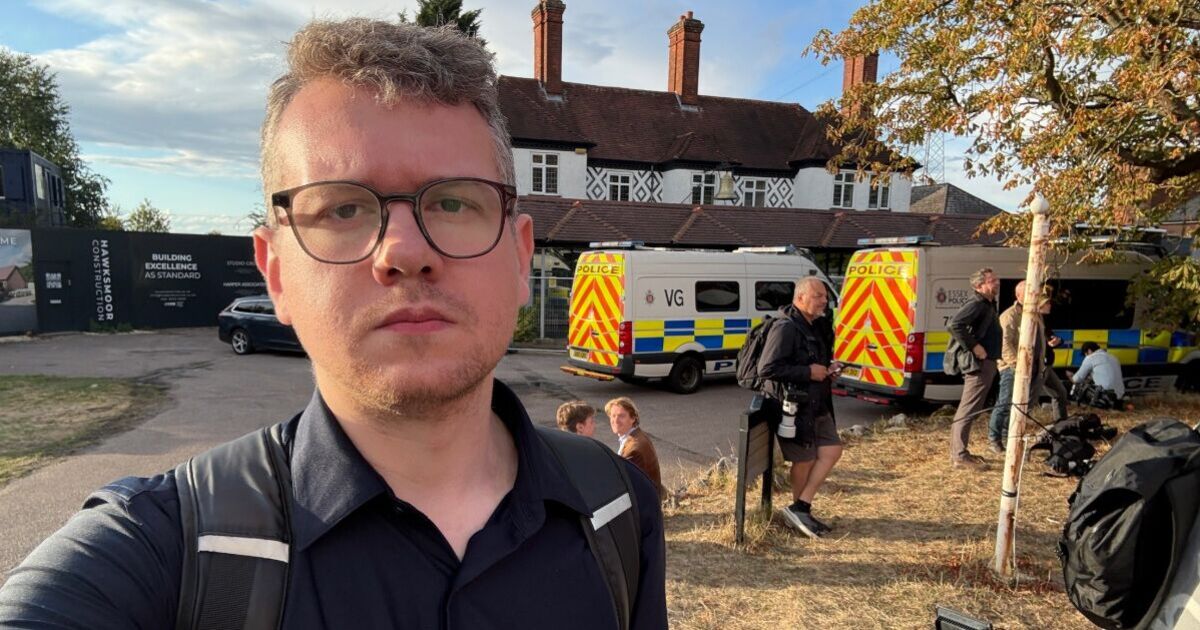The Bell Hotel in Epping has been at the centre of a massive nationwide political storm over the summer, as Brits voiced fury over the housing of asylum seekers in their communities. A resident migrant was charged with sexually assaulting a 14-year-old girl in July, which sparked demonstrations across the country. Ethiopian national Hadush Gerberslasie Kebatu is now facing jail, after being found guilty of two counts of sexual assault earlier this month.
On August 29, the Court of Appeal overturned a temporary injunction granted by the High Court, which would have meant 138 asylum seekers could not be accommodated at the hotel after September 12. Later that day, I was dispatched to the Essex hotel to interview those who had gathered outside the building. People against the housing of migrants locally voiced their fears that among the new arrivals could be dangerous individuals who could pose a danger to residents, especially women and children.
Counter protesters would point out that the likelihood of finding a predator within a group of people is the same, no matter where they come from, and there are plenty of home-grown monsters in Britain. As I previously argued, it is important not to be overly censorious, and to bear the points of view of both sides in mind in the name of empathy, nuance and community happiness.
The protesters I spoke to were obviously angry that asylum seekers would not be moved away after all, expressing to me the now familiar concerns about the safety of them and others.
Some others took it very personally, suggesting that people inside The Bell were laughing at them.
A car, which appeared to contain hotel occupants, exited the building, and was greeted by boos from a couple of those assembled outside.
I was struck by how dogged some of these people were, coming out again and again to voice their opposition to the contentious status quo, with a number proudly proclaiming that they had been to nearly every gathering on Thursdays and Sundays.
Protests operated as a “trigger” for an application for the injunction at the High Court, the Court of Appeal suggested, adding that if an outbreak of protests enhances the case for a planning injunction, “this runs the risk of acting as an impetus or incentive for further protests”, some of which may be disorderly, around asylum accommodation.
A letter, published on Monday and signed by the group leaders of Epping Forest District Council, the Police Fire and Crime Commissioner for Essex, the leader of Essex County Council, Epping Town Mayor and the MP for Epping Forest, said Epping residents had experienced “unprecedented levels of anxiety and disruption” and called on protesters to allow the area to “return to normal”.
We will have to see if demonstrations continue to occur or fizzle out.
The people I spoke to were of the firm belief that protests would keep happening.
Nigel Farage had suggested shortly before my visit to the hotel that civil disorder could be imminent if the situation were not resolved.
Richard Brace, 60, a carer for a relative, who has lived in the Essex town all his life, seemed to share a similar view. Hoisting aloft a Union Flag, he told me: “We’ll keep protesting. Whether it’s going to change anyone’s mind is another matter.
“But we will be here every Thursday and Sunday, and whatever days in between.”
The ruling went against the public’s wishes, he said, adding: “It’s going to cause disruption; it’s going to cause bad feeling.”
Retired electrician Roger, 75, who declined to provide his second name, added perhaps the most chilling line I heard that day: “I’m dying for a fight before I die.”
In the background, a pro-Tommy Robinson tune was played from a speaker, as well as Sweet Caroline.
Walking away, I felt slightly disturbed, and sincerely hoped that Roger does not get a chance to revel in any fighting.
